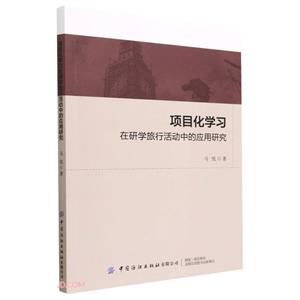掃一掃
關注中圖網
官方微博
本類五星書更多>
-
>
妙相梵容
-
>
基立爾蒙文:蒙文
-
>
我的石頭記
-
>
心靈元氣社
-
>
女性生存戰爭
-
>
縣中的孩子 中國縣域教育生態
-
>
(精)人類的明天(八品)
項目化學習在研學旅行活動中的應用研究 版權信息
- ISBN:9787522901800
- 條形碼:9787522901800 ; 978-7-5229-0180-0
- 裝幀:一般膠版紙
- 冊數:暫無
- 重量:暫無
- 所屬分類:>>
項目化學習在研學旅行活動中的應用研究 內容簡介
《項目化學習在研學旅行活動中的應用研究是一項對國內研學旅行活動開展過程中項目式學習方法應用情況的定量研究。在對相關概念的厘清與文獻整理分析的基礎上,構建了研學旅行活動中的項目化學習應用模型;并以研學旅行指導師為調研對象進行了問卷調查;問卷數據分析結果支持了研學旅行活動中項目式學習方法應用情況的基本假設。在探討模型路徑影響因素的同時,也對研學旅行活動中項目式學習的應用前景與發展方向進行了展望。本書適合于旅游行業與教育行業工作者閱讀,也期望能為研學行業發展以及研學企業管理決策的實施提供一些參考。
項目化學習在研學旅行活動中的應用研究 目錄
Chapter 1 Introduction to the Study
1.1 Background of the Study
1.1.1 Concept Development of Research Travel
1.1.2 Connotation of Research Travel
1.1.3 Practical Characteristics of Research Travel
1.1.4 Practice in Project–Based Learning
1.1.5 Research Travel Practice with Project-Based Learning
1.2 Problem Statement
1.3 Purpose of the Study
1.4 Research Questions
1.5 Conceptual Framework
1.6 Significance of the Study
1.6.1 Significance to Practice
1.6.2 Significance to Theory
1.7 Summary and Transition
Chapter 2 Literature Review
2.1 Theoretical Foundation
2.1.1 Dewey's Practical Theory
2.1.2 Grossman's PBT Core Practice Theory
2.2 Literature Review
2.2.1 Research Travel Activities
2.2.2 PBL Approach
2.2.3 Student Engagement
2.2.4 Student Disciplinary Learning
2.2.5 Student Collaborative Learning
2.2.6 Student Authentic Learning
2.2.7 Student Iterative Learning
2.2.8 Student Creative Learning
2.3 Hypotheses Development
2.4 Summary and Conclusions
Chapter 3 Research Method
3.1 Research Design and Rationale
3.1.1 Development of Main Constructs
3.1.2 Quantitative Research Design
3.2 Methodology
3.2.1 Population
3.2.2 Sampling and Sampling Procedures
3.2.3 Data Collection and Screening
3.2.4 Questionnaire Design
3.2.5 Instrumentation and Operationalization of Constructs
3.3 Data Analysis Plan
3.3.1 Demographics Report
3.3.2 Descriptive Statistics
3.3.3 Measurement Model Assessment
3.3.4 Structural Model Assessment
3.3.5 Moderation Analysis
3.3.6 Mediating Analysis
3.4 Treats to Validity
3.5 Ethical Procedures
3.6 Summary
Chapter 4 Results
4.1 Data Collection
4.2 Data Analysis
4.3 Demographic
4.4 Measurement Model Assessment
4.4.1 Indicator Reliability
4.4.2 Convergent Validity
4.4.3 Discriminant Validity
4.5 Structural Model Assessment
4.5.1 Construct Validity
4.5.2 Path Analysis
4.6 Moderation Analysis
4.6.1 Moderation Education Analysis
4.6.2 Moderation SG Analysis
4.7 Mediating Analysis
4.8 Hypotheses Results Analysis
4.9 Summary
Chapter 5 Discussion, Conclusions, and Recommendations
5.1 Interpretation of Findings
5.1.1 General Review of the Research
5.1.2 Analysis of the Findings
5.2 Limitations of the Study
5.2.1 Sample Size and Selection
5.2.2 Time Cycle Limitation
5.2.3 Specific Application Measures Limitation
5.2.4 Insufficient Exploration of Influences
5.3 Recommendations
5.3.1 Recommendation for the Sample Size and Selection
5.3.2 Recommendation for the Project Time
5.3.3 Recommendation for Specific Application Measures
5.3.4 Recommendation for More Influences Study
5.4 Implications
5.4.1 Theoretical Implications
5.4.2 Practical Implications
5.5 Conclusion
References
Appendix A Questionnaire (English Version)
A Survey on the Application of Project-Based Learning Methods in Research Travel Activities
Appendix B Questionnaire (Chinese Version)
項目式學習方法在研學旅行活動中的應用問卷
1.1 Background of the Study
1.1.1 Concept Development of Research Travel
1.1.2 Connotation of Research Travel
1.1.3 Practical Characteristics of Research Travel
1.1.4 Practice in Project–Based Learning
1.1.5 Research Travel Practice with Project-Based Learning
1.2 Problem Statement
1.3 Purpose of the Study
1.4 Research Questions
1.5 Conceptual Framework
1.6 Significance of the Study
1.6.1 Significance to Practice
1.6.2 Significance to Theory
1.7 Summary and Transition
Chapter 2 Literature Review
2.1 Theoretical Foundation
2.1.1 Dewey's Practical Theory
2.1.2 Grossman's PBT Core Practice Theory
2.2 Literature Review
2.2.1 Research Travel Activities
2.2.2 PBL Approach
2.2.3 Student Engagement
2.2.4 Student Disciplinary Learning
2.2.5 Student Collaborative Learning
2.2.6 Student Authentic Learning
2.2.7 Student Iterative Learning
2.2.8 Student Creative Learning
2.3 Hypotheses Development
2.4 Summary and Conclusions
Chapter 3 Research Method
3.1 Research Design and Rationale
3.1.1 Development of Main Constructs
3.1.2 Quantitative Research Design
3.2 Methodology
3.2.1 Population
3.2.2 Sampling and Sampling Procedures
3.2.3 Data Collection and Screening
3.2.4 Questionnaire Design
3.2.5 Instrumentation and Operationalization of Constructs
3.3 Data Analysis Plan
3.3.1 Demographics Report
3.3.2 Descriptive Statistics
3.3.3 Measurement Model Assessment
3.3.4 Structural Model Assessment
3.3.5 Moderation Analysis
3.3.6 Mediating Analysis
3.4 Treats to Validity
3.5 Ethical Procedures
3.6 Summary
Chapter 4 Results
4.1 Data Collection
4.2 Data Analysis
4.3 Demographic
4.4 Measurement Model Assessment
4.4.1 Indicator Reliability
4.4.2 Convergent Validity
4.4.3 Discriminant Validity
4.5 Structural Model Assessment
4.5.1 Construct Validity
4.5.2 Path Analysis
4.6 Moderation Analysis
4.6.1 Moderation Education Analysis
4.6.2 Moderation SG Analysis
4.7 Mediating Analysis
4.8 Hypotheses Results Analysis
4.9 Summary
Chapter 5 Discussion, Conclusions, and Recommendations
5.1 Interpretation of Findings
5.1.1 General Review of the Research
5.1.2 Analysis of the Findings
5.2 Limitations of the Study
5.2.1 Sample Size and Selection
5.2.2 Time Cycle Limitation
5.2.3 Specific Application Measures Limitation
5.2.4 Insufficient Exploration of Influences
5.3 Recommendations
5.3.1 Recommendation for the Sample Size and Selection
5.3.2 Recommendation for the Project Time
5.3.3 Recommendation for Specific Application Measures
5.3.4 Recommendation for More Influences Study
5.4 Implications
5.4.1 Theoretical Implications
5.4.2 Practical Implications
5.5 Conclusion
References
Appendix A Questionnaire (English Version)
A Survey on the Application of Project-Based Learning Methods in Research Travel Activities
Appendix B Questionnaire (Chinese Version)
項目式學習方法在研學旅行活動中的應用問卷
展開全部
項目化學習在研學旅行活動中的應用研究 作者簡介
馬悅,女,咸陽師范學院,講師。畢業于韓國又松大學工商管理(管理研究)專業,獲得管理學博士學位。主要研究方向為旅游市場開發、旅游項目策劃等。主持并完成多項地方政府、行業企業委托的橫向科研項目,中英文公開發表旅游業相關學術論文10余篇。著有《西部地區研學旅行未來市場的發展趨勢研究》。
書友推薦
- >
人文閱讀與收藏·良友文學叢書:一天的工作
- >
山海經
- >
推拿
- >
龍榆生:詞曲概論/大家小書
- >
伯納黛特,你要去哪(2021新版)
- >
隨園食單
- >
經典常談
- >
中國歷史的瞬間
本類暢銷
















